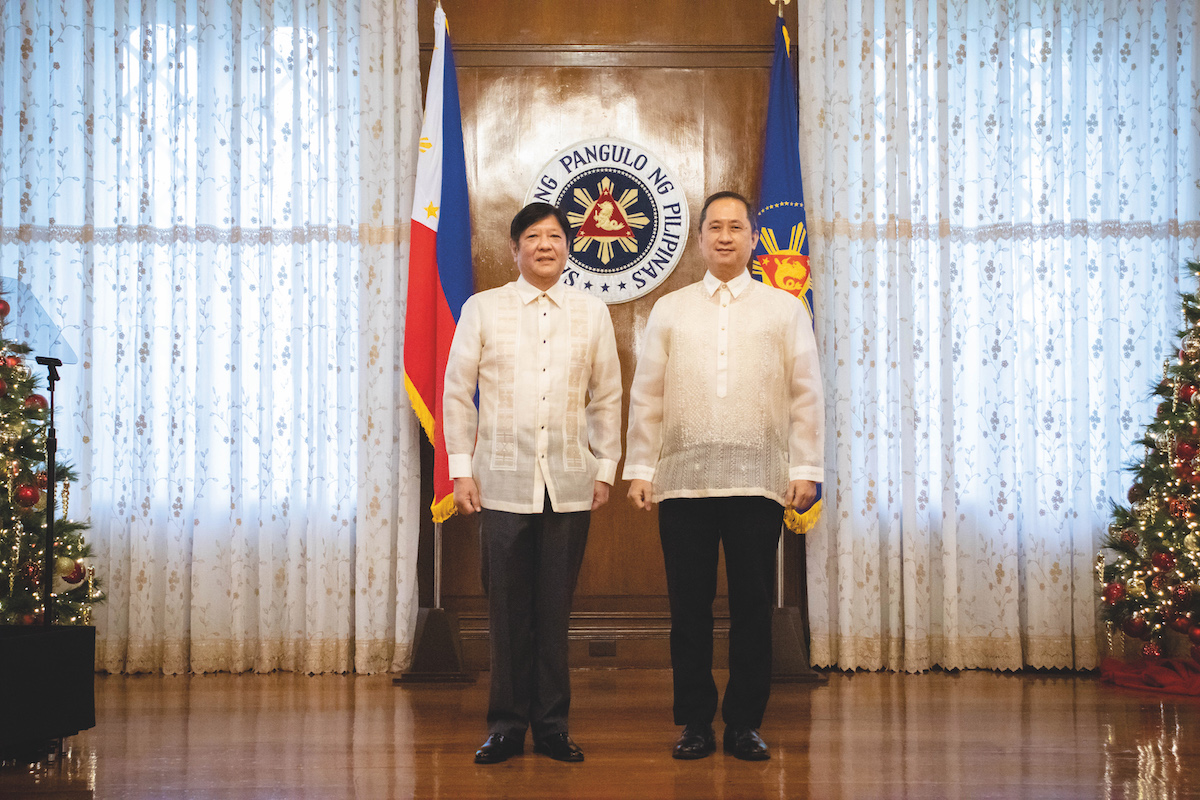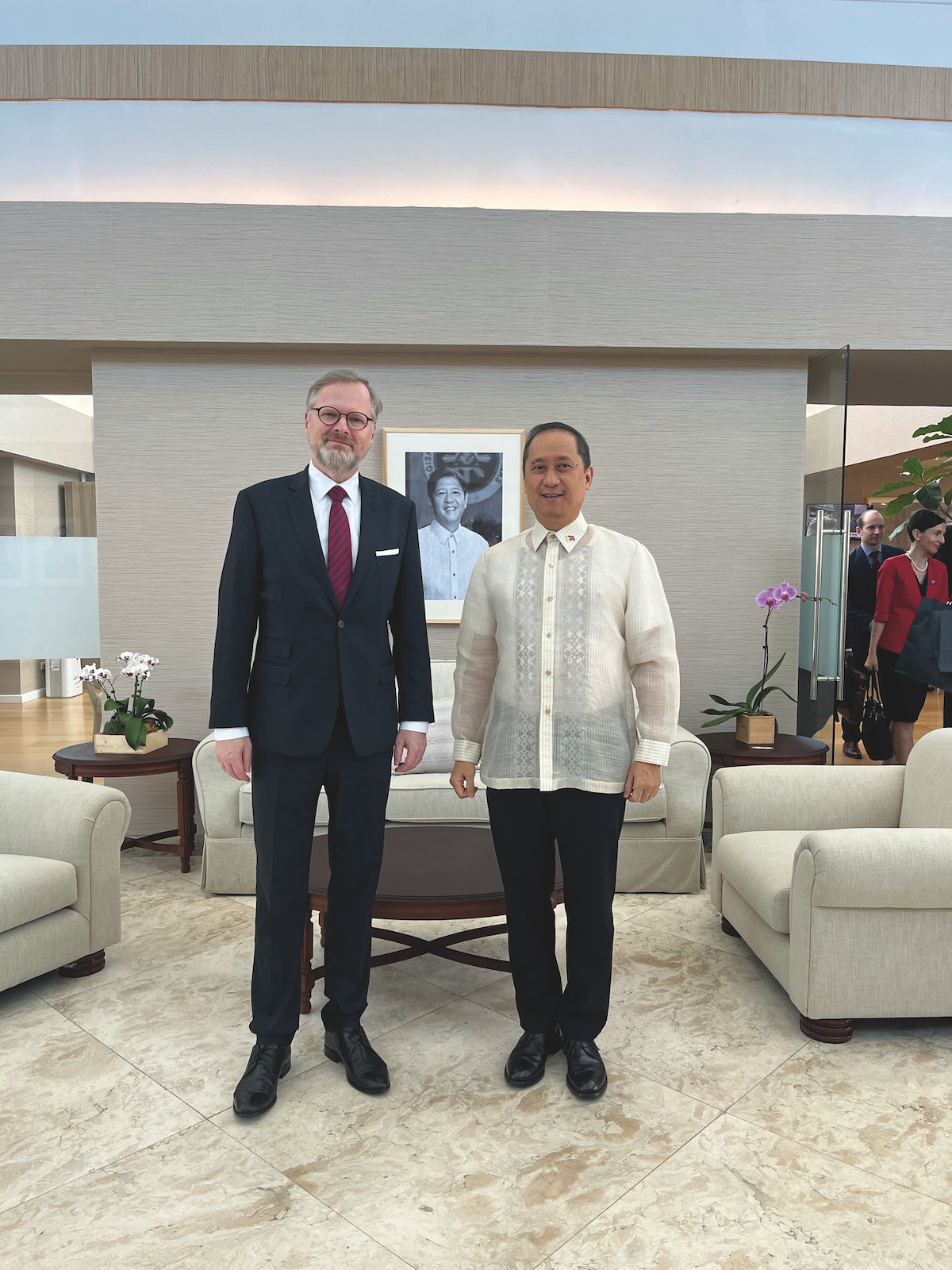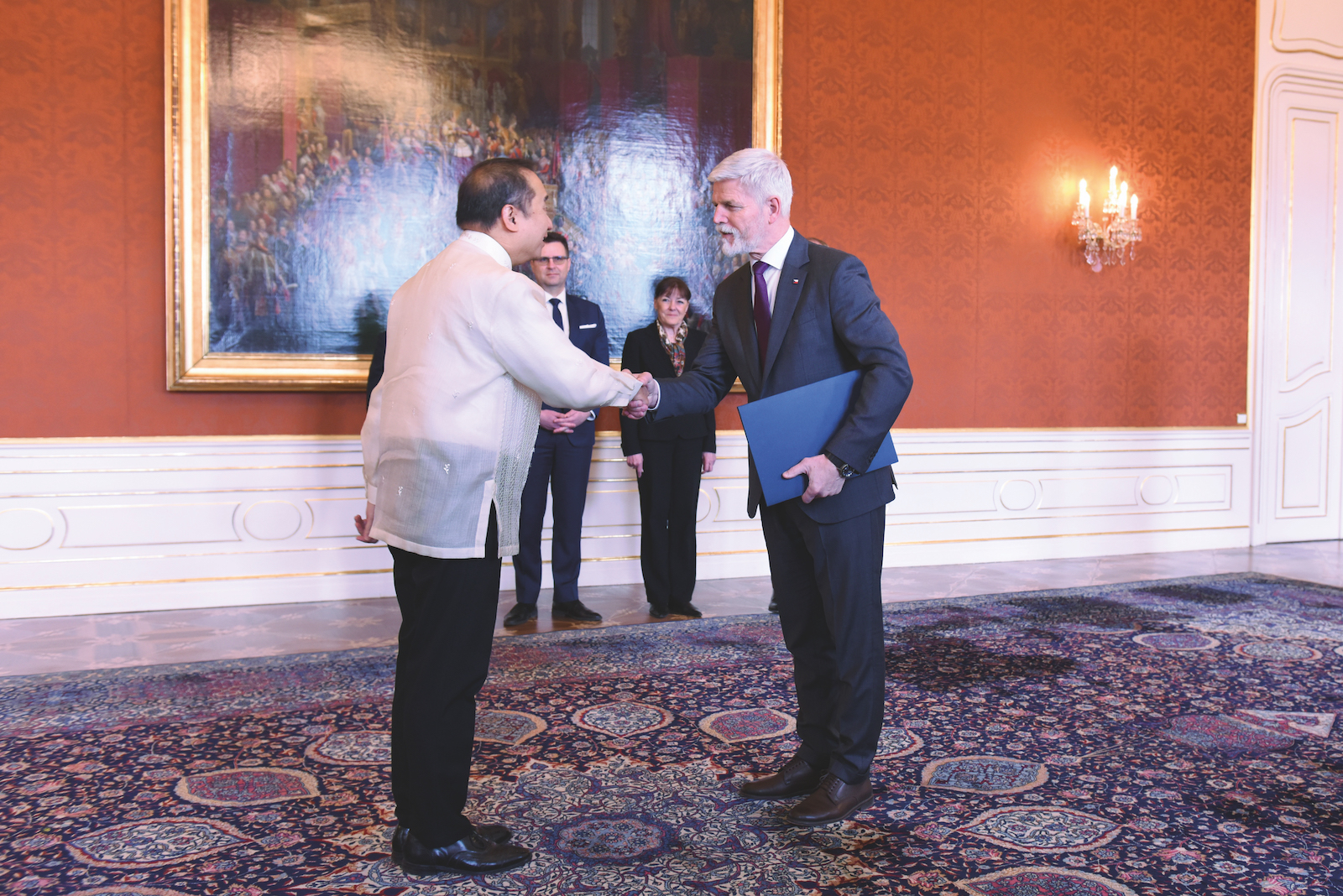“Entering a new era after 50 years of bilateral relations”

H.E. Mr. Eduardo R. Meńez, Ambassador of the Philippines and Mr. Ferdinand R. Marcos Jr., President of the Philippines
Text. Martina Hošková and M. Zisso; Photo: archive
“The significance of the Czech Prime Minister’s decision to start his 10-day Asian tour in the Philippines in April 2023 is very much appreciated,” says Ambassador of the Philippines, H.E. Mr. Eduardo R. Meñez. What does he see as the reasons for this visit? Are there any historical ties between the Southeast Asian hub of 7,641 islands, and the landlocked European Czechia? And what is the impact of the fact that 10 million Filipino citizens live outside of their country?
Tell us about yourself, please.
I believe that everyone’s personality is the result of the sum of a lifetime of experiences, and a combination of “nature” and “nurture.” I am a devoted public servant, pursuing the ideals of my parents, both of whom also worked for the government – my father as a diplomat, and my mother as a professor at the state university, whenever we were on home assignment.
My objective as a diplomat is to communicate the common interests between our countries, in order to attain the objective of recognizing the mutual benefits of working together, for a “win-win” situation. Simply put, the AEP (Ambassador Extraordinary and Plenipotentiary) that is ascribed to my position means, to me, an “Advocate of Enhanced Partnerships.”
But aside from my professional tasks, I am at the stage in my life where I hope that I have succeeded in raising a happy family, and in contributing positively to society. I must thank my parents for giving me the life skills to navigate to where I am today.
Can you introduce your country?
The Philippines, an archipelagic country of 7,641 islands, is one of the fastest-growing economies in Asia. In 2022, our economy grew by 7.1%, and is projected to grow by about 6.0% in 2023.
As part of Southeast Asia, the Philippines offers itself as a hub for foreign companies, including the Czech Republic, for them to expand their service and manufacturing operations, as well as expand their market access to 663.9 million consumers in the region. Out of that total, over 100 million come from the Philippines.
Aside from its geostrategic location in Asia, it is home to a young and productive, English-speaking, and highly trainable labour force. Czech companies who continue to hire Filipino workers can attest to their character and skill sets, which have increased company productivity significantly. It is for some of these reasons that I believe that the Czech Prime Minister made the Philippines the first stop in his six- country Asian trip in April 2023.
Furthermore, like the Czech Republic, the Philippines values freedom, democracy, and human rights – the main foundations that support our sustained political, social, and economic growth and development. The Philippines has one of the oldest constitutions in Asia, the 1899 Malolos constitution, and this spirit of nationalism and democracy has subsisted throughout our history.
Have you always wanted to become an ambassador?
I am a second-generation diplomat, so it can be safely said that I was born into the diplomatic service. Like many other children of diplomats, it is not unusual for us to follow in our parent’s footsteps.
Even as a young child, I believed that I was “channelled” to become the diplomat in our family, and I never really thought of pursuing any other career. So many of my life choices naturally led me to prepare for it, and eventually take the competitive examination to enter the Foreign Service.

H.E. Mr. Eduardo R. Meńez, Ambassador of the Philippines and Mr. Petr Fiala, Prime Minister of the Czech Republic
You have been in the Czech Republic for quite a short time. Can you share your first impression?
I was fortunate, as a young diplomat, to have been tasked with preparing for the state visit of former Philippine President Fidel V. Ramos to the Czech Republic in 1997; the same year our government opened our resident embassy in Prague. Therefore, my first exposure to this country is quite historic, and coming back to Czechia in time for the 50th anniversary of our bilateral relations makes me feel like there is an element of destiny involved.
My impression of the Czech Republic after over 25 years remains very positive – Prague is still a picture-perfect tableau of “old Europe”, which draws millions of tourists. Even the Philippine national hero Jose Rizal visited Prague and Litoměřice in May 1887, and marvelled at the same sites we see today. Also related to Rizal’s story is the fact that one of his closest friends was Prof. Ferdinand Blumentritt, whom he visited in 1887. Prof. Blumentritt is one of the known graduates of Charles University, and one who is familiar to all Filipinos because of their friendship. So, the close ties between our people reflect another impression that I am happy to note and propagate, especially as more Filipinos are being allowed to work in this country.
I am eager to see the rest of the country, and meet and make many new friends over the next few years, in order to truly get the full experience.
How many countries have you served in so far?
If you count the number of foreign assignments that I have had since I joined the DFA, then it would be five – six years in the Netherlands, two years in Singapore, four years in the US (at the Philippine Mission to the UN in New York), over three years in the Islamic Republic of Iran (where I also covered Turkmenistan and Uzbekistan as non-resident AEP), and about three years in Japan. If you consider my life growing up, then there would be more; as a matter of fact, I was actually born in Italy.
How does being an ambassador define your lifestyle?
Having grown up in a diplomatic household, one could say that I have seen how ambassadors live and behave all my life – so finally becoming one in 2013 was the culmination of this observation and preparation. I am very fortunate to have had the full support of my family throughout this journey, especially from my wife Marissa. She is just as important in ensuring my success as a diplomat, and in raising our family throughout the various life dislocations that can be challenging for those following the diplomat spouse / parent.
What was the best adventure you have ever had?
Diplomats are, by the very nature of our work, exposed to the possibilities of experiencing activities that many others can only dream of doing. While I have many fond memories of all our travels, I would say that when it comes to adventure it probably would be personally driving (in shifts with the embassy driver) through the hinterlands of Turkmenistan in the wee hours of the morning, on a long drive from Tehran to Turkmenbashi port, to attend a conference. I daresay it is not a route that many diplomats have taken. I enjoy driving, and another memorable long trip would be one from The Hague to Prague, which I did with my family in the late 1990s.
What was the weirdest thing you have dealt with?
As a career diplomat of a country whose diplomatic service is involved in the lives of overseas Filipinos from birth to death (in terms of registration for our government records), I entered the service in 1991, and at that time it was not unusual to physically inspect the caskets of our nationals who died abroad, in order to ensure no forbidden items are transported as well. I have also had the pleasure of conducting civil marriage rites for Filipinos who chose to be betrothed on the embassy or consular premises. Thus, in this way, we really represent the entire Philippine society and institutions when we are abroad – civil registrar, wedding officiator, marriage counsellor, dispute settler of arguing nationals, rescuer of distressed nationals, guest of honour at social gatherings, and general “influencer” given the respect for the office.
Is that the most difficult part of being an ambassador?
For Philippine ambassadors, one of our foreign policy’s three pillars is the protection and promotion of the welfare of our many millions of overseas Filipinos found all over the world. While the Philippines’ migration policies as a country of origin are recognized to be among the most comprehensive in the world, the constant public pressure to ensure that every Filipino abroad is given appropriate attention when needed, especially in this age of social media and instant communication, is a challenge that many foreign governments are also now experiencing. With over 10 million Filipinos in over 200 countries and territories around the world, if an emergency happens, Philippine media will immediately ask how many Filipinos are affected, and what is the embassy (or consulate) doing to help them. We are trained to prepare for these contingencies, and if we are successful, then the effort is all just in a day’s work. One has to constantly remember and be mindful of one’s actions, statements, and appearances, since misinformation and disinformation can now be very quickly generated and amplified.

H.E. Mr. Eduardo R. Meńez, Ambassador of the Philippines and Mr. Petr Pavel, President of the Czech Republic
What do you do in your free time?
I enjoy experiencing life as a normal person in the countries where we live. In Prague, my wife and I have meandered around the areas of the embassy and the residence to discover the many hidden spots that others may take for granted. Taking Prague’s efficient public transport expands our areas of discovery, and I look forward to driving around the country as well.
I do have other normal hobbies and physical activities, and hope to develop new ones in this rich cultural milieu.
The Philippines is an attractive exotic holiday destination for Czech people. Do you promote your country?
We are pleased to note that the number of Czech tourists in the Philippines is now steadily picking up again after the reopening of the borders. This means that the sustained efforts of the Embassy to promote the Philippines, even during the height of the global health pandemic, are gaining traction.
To increase the awareness of the Philippines in the Czech Republic, we began joining the annual Holiday World and Region World international and regional tourism fairs. Our presence may be small (in terms of exhibition space) as compared to more-budgeted countries, but our continued participation has provided us with positive results.
Additionally, we complemented our participation in the aforementioned fair with meetings with Czech travel and tour companies, including airlines, in order to promote the Philippines as a new and exciting destination for Czech nationals. The Embassy also engaged with students in the Czech Republic, by visiting them in their schools and joining their cultural activities.
While I was the Assistant Secretary for Public and Cultural Diplomacy of the Department of Foreign Affairs, we also launched the online Fiesta Filipinas workshops, which allowed foreigners across the world to learn more about Filipinos and their culture. The successful project, which showed how fiestas were celebrated across the Philippines with matching workshop kits given to selected participants, supported the efforts of the Department of Tourism to promote our country. In a way, we gave foreigners the hope that one day, after the pandemic, they could get out of their own homes and countries and visit the Philippines in order to experience, for real, our brand of fun and adventure, our cuisine that differs from region to region (in accordance with the abundance of certain natural resources), the influence of nations that historically engaged with the Philippines (pre- and post-Hispanic periods), and the warmth of our hospitable people.
Together with the ASEAN Committee in Prague, the Philippines co-organizes or participates in food and film festivals in the Czech Republic. Last year, we were very pleased with the public reception of our Philippine films – Quezon’s Game and An Sadit na Planeta – which showed the humanity and creativity of Filipinos, as well as the sold-out Filipino food and beverage from our vendors at the Festival of Embassies: Food and Culture. This year, we are again looking forward to participating in both events.
What is the current status of Czechia – Philippines relations?
Relations between the Philippines and the Czech Republic, I believe, are progressing more dynamically. The recent visit of Prime Minister Petr Fiala to the Philippines attests to the desire of both countries to strengthen political and economic relations, build on existing areas of cooperation, and find new opportunities, as well as deepen the bonds of friendship, which were started even before we formally established diplomatic relations 50 years ago. The significance of the Czech Prime Minister’s decision to start his 10-day Asian tour in the Philippines in April 2023 is very much appreciated.
This interview is done on the occasion of the National Day of the Philippines. Please, feel free to make a wish on this special day.
This year marks the 125th anniversary of Philippine Independence and Nationhood. As a Filipino, this is a proud moment for me and my countrymen because it reminds us of how far we’ve come in getting to our current state of political and economic freedom. We have a democratically elected government, and existing institutions that operate on transparency and meritocracy. We have an economy that has one of the fastest growths in the world, not just in Asia. We have a workforce that not only runs the industries of our country but also, directly and indirectly, contributes to the operations of manufacturing firms and medical institutions across the globe, including the Czech Republic. Thus, as a citizen of my country, I wish that the Philippines would preserve its values that beget equitable growth and sustainable development.
As a top diplomat of my country in the Czech Republic, I wish for deeper and stronger bonds between Filipinos and Czechs – politically, economically, and culturally. Our two nations’ strengths and needs complement each other, and it is my duty to ensure that our governments recognize these positive attributes. I hope that this 50th anniversary of bilateral relations in 2023 signals a new “golden age” of mutually beneficial exchanges.

